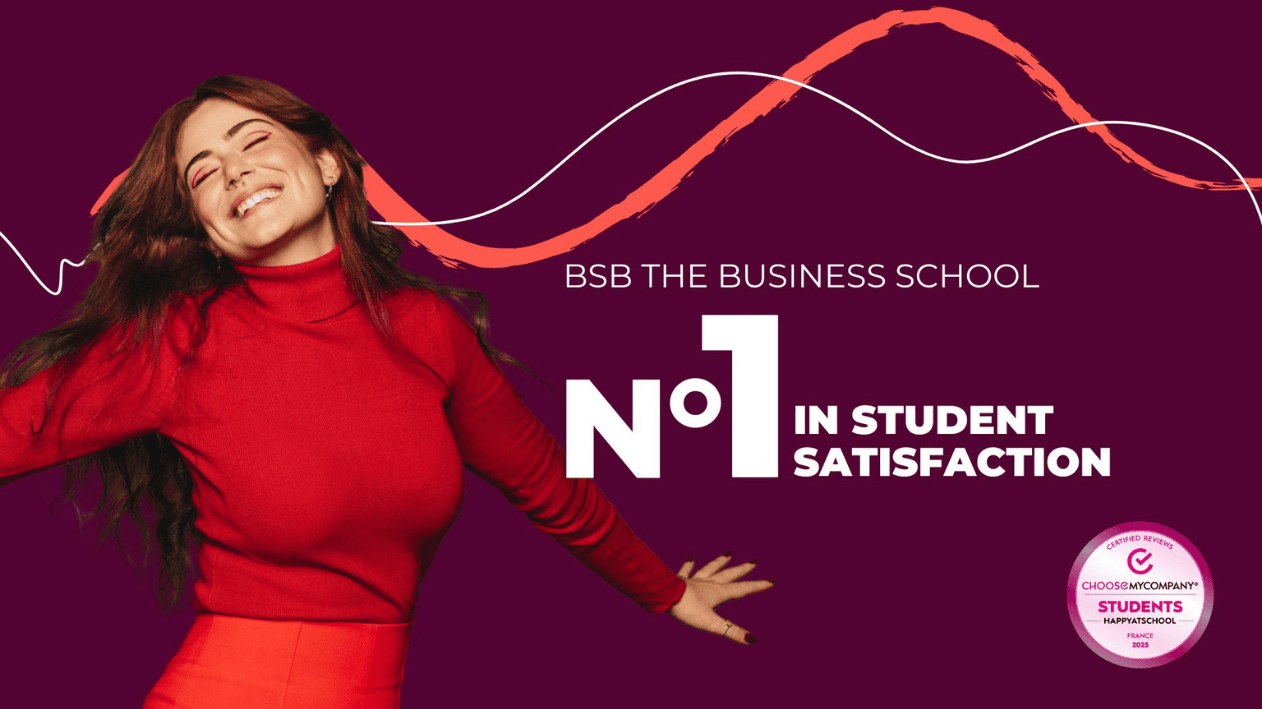Before the RDD 2024, a discussion between Stéphan Bourcieu and Thomas Friang

BSB is hosting the 2024 Rencontres du Développement Durable on November 27 in Lyon: joint interview to present this 5th edition
Since their launch in 2020, BSB has been a partner of the Rencontres du Développement Durable (RDD) - Sustainable Development Meetings. Initiated by the Open Diplomacy Institute, this event aims to help French people form an informed opinion on the challenges of sustainable development through inclusive and accessible debates, while promoting the 2030 Agenda. It has now become an essential democratic event dedicated to ecological transition.
This year, the BSB stage takes place in Lyon on November 27. Before this afternoon, which promises to be particularly rich, we spoke with Thomas Friang, Founder of the Open Diplomacy Institute, and Stéphan Bourcieu, Dean of BSB, on the theme of this edition.
1) Thomas Friang, what is the theme of the RDD 2024?
Thomas Friang: ”It's the 5th year that the Open Diplomacy Institute co-organized the RDD with BSB! We are very proud of this partnership which allows us, this year, to set course for Lyon on November 27 to deal with the theme “Good COP/Bad COP: the planet facing geopolitical risk? ”.
We will be happy to meet the students, the professors, the entire BSB community there, to address the questions raised by the series of three COPs this fall.
With our excellent speakers, we will be able to come back to the Biodiversity COP chaired by Colombia, followed by the Climate COP in Azerbaijan before the Desertification COP which will be held in Riyadh in December.
We will return to the decisions taken at these summits for the planet; and we will focus on the international context in which they are taking place.
Our objective is to understand how the state of the world competes between geopolitical risks and ecological issues, how conflicts re-examine our priorities and cause a general feeling of confusion.
BSB and the Open Diplomacy Institute invite you to meet you on November 27 in Lyon for this free conference, open to all, and intended for curious people who want to decipher the world. ”
2) Stéphan Bourcieu, the subject of the RDD this year is therefore “Good COP/Bad COP: the planet facing geopolitical risk? ”. Why is it important to discuss this subject in a business school via a citizen conference?
Stephan Bourcieu: “At BSB, our mission is to spread knowledge beyond our walls. By co-organizing this citizen meeting, we are strengthening our active role in society and sending a clear message of commitment to our students and partners.
For the past five years, we have had the honor of collaborating with the Open Diplomacy Institute, a partnership we are particularly proud of. In a business school, commitment is essential, because we train young people for jobs where societal impact is fundamental today and will be even more so tomorrow.
Our students are increasingly looking for meaning in their careers and, often, even launch impact projects as soon as they graduate. Our vocation is to form responsible, socially and environmentally aware citizens.
This conference is a free and open event for all, where everyone can take part in debates around geopolitical and environmental challenges. I invite everyone to register and join us at BSB Lyon on November 27 to benefit from the richness of these discussions.”
3) Thomas Friang, what about the current COPs?
Thomas Friang: ”This autumn, the COPs of the major United Nations environmental conventions are following one another: biodiversity, climate and desertification.
The COP16 Biodiversity, held in Colombia in October, disappointed. Two years after the adoption of the Kunming-Montreal Global Framework, it needed to make this dynamic a reality by defining monitoring indicators and mobilizing $700 billion per year to fill the financing gap. The result: no significant progress, and only 44 countries out of nearly 200 have presented a national strategy.
The COP29 Climate, currently in Azerbaijan, aims to set a new financial objective to support the countries of the South. The historic goal of $100 billion was reached late, and an upward revision seems unlikely in the current context. This COP is seen as a preparatory step to raise the ambition for COP 30 in Brazil in 2025, but the momentum remains weak, in the absence of all the major international leaders.
Finally, the Desertification COP, scheduled to take place in Saudi Arabia in early December, will also address financial issues, as well as the adaptation of vulnerable countries and climate justice, in particular in the face of population displacement. Therefore, if the Climate COP results in a second failure after the Biodiversity COP, hopes for Riyadh appear very limited.
This series of COPs is likely to be very disappointing: we can talk about a real “autumn for the planet”. And yet, let us always remember, taking action costs 20 times less than inaction. How can we remedy so much inertia in a geopolitical context that is more tense than ever?
This is the question we will try to address at the RDD 2024. Come out in large numbers to these citizen conferences that BSB is hosting on September 27! ”

4) Stéphan Bourcieu, in light of the research conducted in your business school, what are the success factors for companies engaging in the ecological transition?
Stephan Bourcieu: ”The research conducted by our faculty on these issues shows that a true ecological transition cannot simply be added to the usual activities of the company as an additional brick. It transcends classical disciplines — strategy, finance, marketing, etc. — because it involves a profound reconsideration of business models, especially if we aim to achieve the Sustainable Development Goals (SDGs).
The results of our works reveal that effective engagement requires that each actor — businesses, governments, consumer-citizens — play their part in order to avoid the “triangle of inaction”, where everyone believes that the other must act. The SDGs, in particular SDG 17 on partnerships, highlight the importance of this collaboration.
Welcoming the RDD to BSB for five years and integrating our researchers into them reflects our desire to have a concrete impact, not only in the academic community, but also by working closely with businesses, institutions and civil society.”
5) Thomas Friang, ecological transition requires constant mobilization and sustained ambition. How does the geopolitical context complicate the transition?
Thomas Friang: ”Between COP16 Biodiversity, which ended in Colombia at the end of October, and COP29 Climate, which started in Azerbaijan in mid-November, Donald Trump was re-elected President of the United States.
His return is accompanied by an energy program that takes us further away from the goals of the Paris Agreement, which he has decided to leave again. Not to mention the fact that his re-election will weigh heavily on the international context, which is already affecting the functioning of the COPs: I am talking about the Russian aggression against Ukraine and the outbreak of fire in the Middle East.
We must also take into account the geopolitical situation in the region hosting the Climate COP: the presidency of the COP is assumed by Azerbaijan, which has taken up arms against Armenia in Nagorno-Karabakh. The European Union supports Armenia. Therefore, when the President of Azerbaijan uses his COP opening speech as a way to attack European foreign policy in front of the world press, geopolitics comes to the forefront in the face of climate issues.
After the disappointment in Cali and the tensions in Baku, the momentum towards Riyadh (where COP16 Desertification will be held in December) is unfavorable.
When we meet in Lyon on the BSB campus on December 27, the Climate COP will have come to an end. It will be a good time to outline an answer: how to protect the planet from geopolitical risk? To find out more, go to the RDD 2024! ”
6) Stéphan Bourcieu, a mountain of uncertainty seems to be piling up. What does management science tell us about the right approach for organizations to take to face such complex challenges?
Stephan Bourcieu: ”This is a complex issue that is the subject of much debate. Management science does not provide a single or consensual answer. On the one hand, some advocate “all-technological”, while others are committed to “degrowth”. The best approach may well be to chart a third path, an integrated approach that reconciles economic, social and environmental dimensions.
We must never forget that companies are based on a virtuous Growth-Profitability-Sustainability spiral whose momentum must be maintained and at the same time renewed the principles in order to integrate a sustainable development dimension. But this requires a profound rethinking of current economic models in order to adapt them to the challenges of tomorrow's world.”
Information and registrations : https://www.rencontres-developpement-durable.org/rdd2024



_EN.png)
